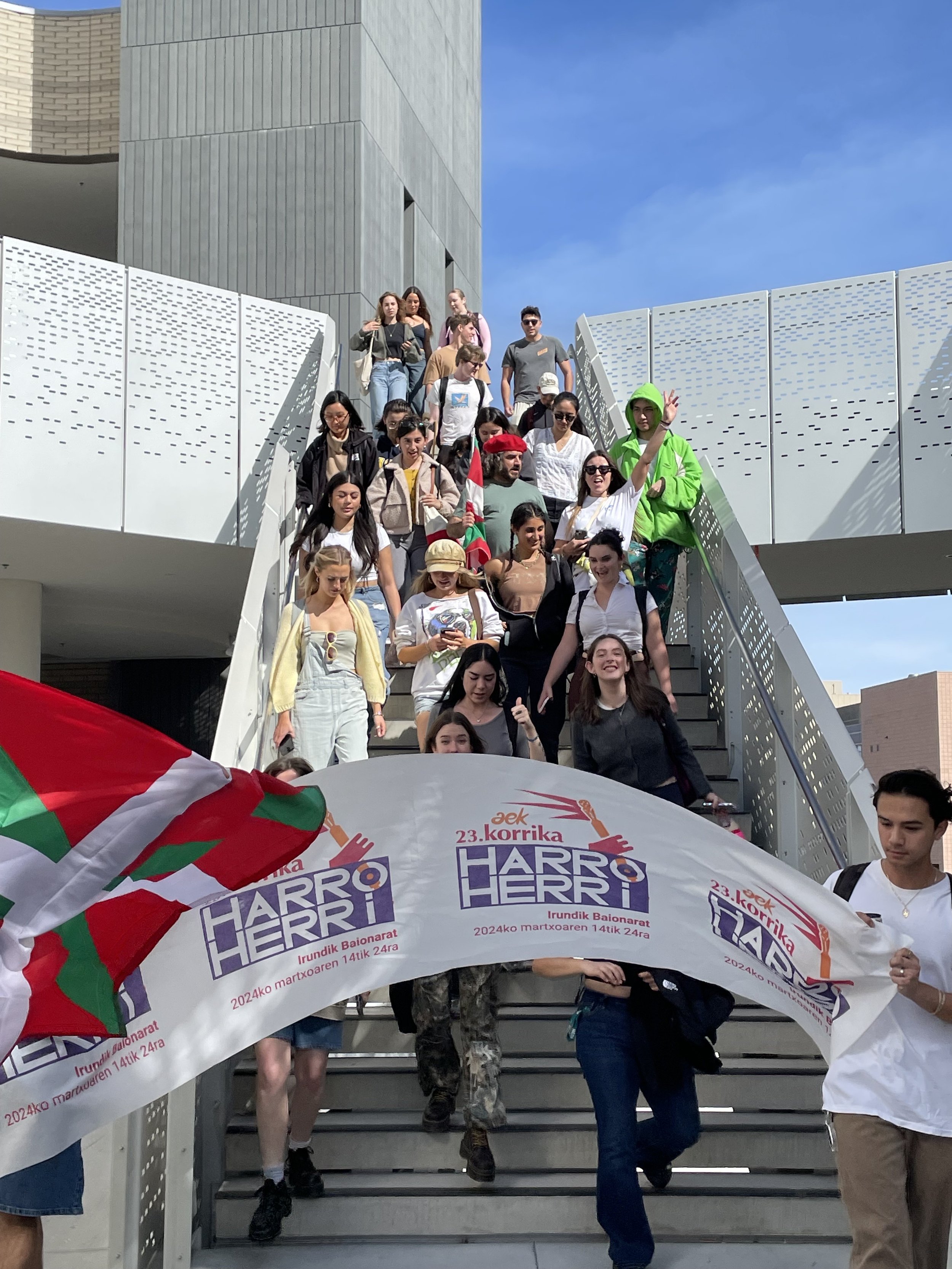By Sofia Clifford
Maitane Murumendiaraz Arana, UCSB Lecturer in Basque Studies, is exposing students to the challenges and achievements of a minority culture and language, which often resonates with their own minority experiences.
As the oldest living language of the Basque Country, Euskara is more than just words—it’s a fight for cultural awareness in a world that often overlooks its significance.
For UC Santa Barbara lecturer Maitane Murumendiaraz Arana, the Euskara language is a lifeline to her Basque heritage and one that has defied centuries of censorship. She is bringing that fight to her classroom, challenging students in the Department of Spanish and Portuguese to immerse themselves in the language’s cultural fabric.
After recently joining UCSB’s Center for Basque Studies, Murmendiaraz is pioneering an array of courses infused with her own personal flair. These offerings invite English and Spanish-speaking students to discover the heart of the Basque people whose identity is not only woven in their language, but also in a deep-rooted history and unique sense of pride.
Spanning northern Spain and southwestern France, the Basque Country has a history of striving for autonomy and preservation of its heritage, despite periods of suppression. Many of Murmendiaraz’s courses incorporate her upbringing in Bergara, a small town in the Gipuzkoa province, so her students can, as she says, “feel even closer to what I am teaching.”
Following her time at the University of the Basque Country, Murmendiaraz first taught Basque studies in Gipuzkoa, and is now at UCSB on a three-year teaching program through the Etxepare Basque Institute, a program that seeks to raise the international profile of the Basque language and culture. In less than three years at UCSB her class sizes have grown from five to approximately 30. She recently sat down to unpack how she is exposing UCSB students to the Basque cultural identity and its complexities in an increasingly globalized world.
Q: What are the different courses that you teach and how were they created?
A: I primarily used the curriculum created by my predecessor, and have taught one language as well as one culture-related course each quarter. In the language courses, I teach the basics of Euskara, and the consecutive quarter is often a continuation of the previous, depending on the students’ familiarity. Culture-related courses vary by quarter between general Basque Studies, Gender in Basque Culture, Basque Film, as well as Conflict, Memory & Cultural Production.
Q: How were you able to get the word out about your courses?
A: I first put up fliers, but it’s primarily through word of mouth by my previous students. I also have held special events on campus that bring great publicity. Last spring, we held a mini Korrika, a traditional running event held biannually in the Basque Country to promote awareness of the language. It was so rewarding to see my students feel a sense of Basque community, and several participants with Basque heritage were able to connect with one another. This quarter, I hope to hold a mini rural sport competition of traditional Basque athletic competitions.
UCSB guest lecturer Maitane Murumendiaraz Arana held a mini Korrika on campus in last March, connecting her students and those of Basque heritage with this biennial running event held in the Basque Country to promote awareness of the Basque language.
Q: Euskara has a relatively small active speaking population of about 700,000 though the Basque Country has 2.2 million people. Why do you believe it’s important to teach and learn Euskara and its history?
UCSB students march around campus during the mini Korrika in March 2024 to honor and celebrate Basque culture, language, and identity.
A: Euskara, the national language of the Basque Country, is one of the oldest isolated living languages, meaning there are no sister languages. Euskara faced extreme censorship during the reign of Francisco Franco in the mid-twentieth century, which was detrimental to its livelihood as many Basque people were forced to transition towards Spanish, now another language spoken in the Basque Country. However, Euskara now has various dialects as the language evolves, continuing to thrive through its tight-knit, global community of speakers and learners. The process of learning Euskara challenges students to learn a different school of sounds, training their brains in a new way. UCSB is one of 35 schools in the world with a Basque program, and it is a cultural identity I hold very close to my heart.
Q: What message do you hope students take away from learning about Basque culture in relation to their own identities or cultural backgrounds?
A: I believe these courses provide a unique opportunity to learn about the challenges and achievements of marginalized people through a Basque lens, allowing students to reflect upon their own identities through class discussions and analysis, fostering an understanding of cultural resilience and the impact of globalization on minorities.
Q: How has the program grown during your time here, and what do you see for the future of Basque Studies?
A: My courses first had 5 to 15 students, and now usually have around 30. I have even had students with Basque ancestry, and it is special to watch them dive deeper into their cultural heritage. Watching the growth of this unique program that I hope will continue to grow has been so gratifying, and it is bittersweet to finish off my last year exposing students to the cultural fabric and complexities of Basque identity.
Sofia Clifford is a fourth-year UCSB student majoring in Economics and minoring in Spanish. She conducted this interview as part of her Digital Journalism class.




